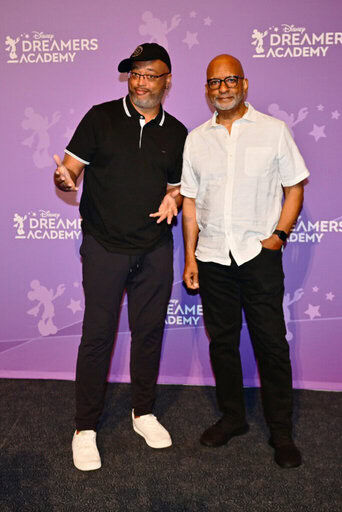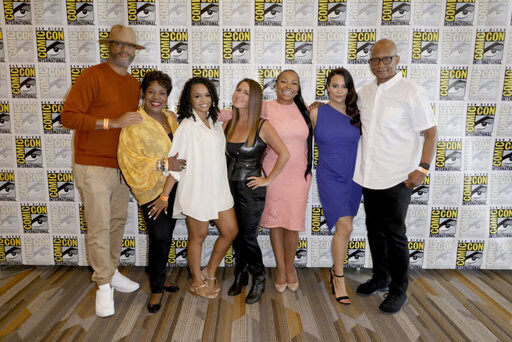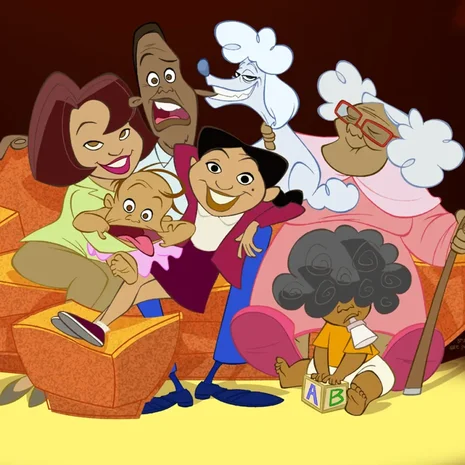Bruce W. Smith and Ralph Farquhar spoke with Boardroom about the cultural impact of Disney Channel’s The Proud Family and the timeliness of the Louder and Prouder reboot on Disney+.
That’s So Raven. Smart Guy. A.N.T. Farm. All of these were Disney Channel shows with strong Black protagonists that made young Black boys, girls, and non-binary children feel seen during a time they were seldom able to see themselves outside of their own homes.

But we couldn’t have a fair conversation about Black representation in children’s and young adult entertainment without the brainchild of Bruce W. Smith and Ralph Farquhar, famously known as The Proud Family.
When asked if he’d ever believe that the series would become as iconic as it is today, nearly two decades after its Disney Channel premiere, co-creator Smith immediately shook his head.
“Nah. Not to the level that we’re at right now,” he said.
Smith, who also served as one of three directors of Matthew A. Cherry’s Academy Award®-winning short Hair Love, knew out of the gate that if he was going to create a show with impact, he needed the right people in his corner.
Enter into the writing room Farquhar, who has created acclaim and buzz around his name in the entertainment industry as the creator and executive producer for the popular sitcoms The Parkers, South Central, and cult-favorite Brandy Norwood-starring Moesha.
“Ralph and I kinda both had the conversation. I don’t think we thought that we could reach these levels. We were just thinking that we just gotta make this show and it’s cool that we’re having fun making the show,” Smith said. “Because there was no social media or nothing like that, we were just making the show in our own little tunnel. Seeing the show out there on Disney Channel was really when I felt like we reached the goal at that point.”
“You can rest assured this show is — I hate the word, but I’m gonna use it, authentic,” Farquhar said. “This is an authentic show through and through.”
The Disney Whisperer
According to Farquhar, social media in the late ’90s and early 2000s was walking down the aisle at the supermarket and telling the good folks that you ran into about how great of a show you were watching, and because Disney didn’t understand the power of word-of-mouth, The Proud Family was not picked up until 2005. Even more of a shock to Farquhar, who also served as the executive producer of Real Husbands of Hollywood, was their invitation to come back to Disney+ for their reboot — The Proud Family: Louder and Prouder.

“We lobbied many, many years to come back to no avail. It happens. There’s a lot of reasons for that. We’re just thankful it did,” Farquhar told Boardroom. “The fact [is] that now in today’s world, with social media being what it is, we got to hear how important this show was to people. It was humbling because that was the first time we got to really experience that, and to hear that was really humbling and tugged at our hearts and made us even more determined, like, ‘Okay, we gotta bring this show.'”
Upon the announcement that there was a reboot in motion, Smith and Farquhar received many submissions into their open suggestion box. From Penny and the gang being in their 40s with children to bringing it all full-circle with a prequel as infants the age of younger siblings Bebe and Cece, the co-creators were certainly open to the discussion of what they should do. Ultimately, when they returned to the Disney+ streaming platform, they knew that they had to do it just right for the original fans as well as the new generation.
Featuring a new mixed and mastered theme song by R&B songstress Joyce Wrice, the Louder and Prouder series features the original cast, including Kyla Pratt as Penny Proud. Debuting its second season Wednesday on Disney+, the animated reboot kicks off Black History Month, featuring Black talent including Keke Palmer, A Boogie wit da Hoodie, Lizzo, Lil Nas X, and Normani. With the same humor and lovable characters as the OG series, this series will now address social issues while giving the show a lens into what true Black diversity looks like.
Farquhar added: “By talking about things that are normally not talked about, whether it’s the issue of race between an integrated group of friends, or a multicultural group of friends, we deal with topics, such as mental health, Juneteenth, race relations, and certain issues around the history of enslavement. That’s what The Proud Family does.”
Back To Basics
After assembling all of the moving parts and creating a proof of concept around what he wanted The Proud Family to be, Smith was ready to make moves with his then-employer, Disney. Working on the movie side of Disney at the time, Smith received a call from an executive at Disney Channel who inquired about the progress of his project because they wanted to test the proof of concept. Unbeknownst to most, before The Proud Family had its takeoff from Disney Channel, it was temporarily living under the Nickelodeon umbrella while its Mickey Mouse-led competitor was “trolling,” as Smith jokingly told Boardroom. Unfortunately, the writing and lived experience embedded within The Proud Family didn’t register with the demographic to which they were shopping it around.

“There’s a part of LA where there are a lot of Black folks, but they weren’t seeing this,” said Smith, a Brooklyn native who wasn’t too familiar with the layout of the West Coast. “Now there’s another part of LA that’s much bigger — Simi Valley, San Fernando Valley, West Hills, Woodland Hills — where they were testing in these spots and it was just a lot of white folks over there. It wasn’t registering to them.”
According to Smith, many viewers thought that Suga Mama, as played by Jo Marie Payton, was “too mean,” when in actuality, it was a reflection of the Black experience and relationship that many can empathize with when it comes to their grandmothers. From the witty banter to the disciplinary actions, a lot of Black households felt seen in both the humor and reality of who Suga Mama’s character was.
“In Germany and in England, they really love their grandmothers,” Farquhar said. “That was actually a big fight and we stood our ground. And of course, what was the most popular character in Germany and England? Suga Mama!”
When Smith finally expressed to his Disney colleagues that he wanted to transform the then-six-minute short into an animated sitcom, he noted that he wanted to create a legacy similar to Farqurah’s with Moesha and The Parkers. When asked if he personally knew the acclaimed creator, Smith answered with an uncertain “yes,” unintentionally manifesting a partnership that would become iconic. While he didn’t know him personally, Smith was a fan of his work and knew that he could offer The Proud Family a pen that would write characters with relatable arcs and stories that would resonate with the audience they wanted to reach. After finally sitting down for breakfast together, the two instantly clicked on the concept and knew that they had something on their hands.
Farquhar’s writing and executive production paired with Smith’s vision and creative direction, and The Proud Family was on its way to becoming something more than an idea in a notebook and meetings between networks.
Huggin ‘Em or Pushin’ Buttons
Unsurprisingly, bringing The Proud Family — a story with Black protagonists and characters of color told through a Black lens — to the forefront of a major media giant came with pushback.
“To be honest, that’s always a discussion,” Farquhar said. “The media has been controlled from a point of view that’s not us and a lot of times the notes come from area of not understanding the culture.”
As an example, he and Smith turned to the initial feedback for hometown bullies The Gross Sisters — Nubia, Gina, and Olei. Most audience members outside of the Black community did not catch that they were painted a shade of blue to represent ashiness.
“If you notice all the girls are named after various lotions — Olei, Gina which was short for Neutrogena, and we couldn’t clear Nivea, so we changed it to Nubia,” Smith shared exclusively with Boardroom. “How do you explain to a white person what being ashy meant to the Black community? They always thought they were blue because of their attitude or something like that, but ashy in the Black community is a big thing and we gotta use lotion.”

Although the Easter eggs of jokes from the Black experience went over the heads of many, Smith and Farquhar received the confirmation they needed when they were able to bring their story to life. As Black men in a space with predominantly cisgender heteronormative upper-middle white males sitting at the top, their fight for the authenticity of their voices was constant. So was their resilience.
“We always had to fight for our Blackness and our Black point of view and we were pretty insistent. Certainly in 2000 when we were making the show originally for the premiere, it was a lot of fights about that,” Farquhar said.
From Suga Mama and The Gross Sisters to Uncle Bobby, played by Cedric The Entertainer, he noted that a lot of references were lost on the audience that mass media giants wanted to target. In actuality, the show was trying to break the mold by addressing the mainstream archetypes of Black culture.
“I think that the appeal to Proud Family was Black folks weren’t stereotypical [and] everybody understood what the references were,” Farquhar said. “It was all based in real stuff and people got that. Literally in the history of TV, it hadn’t been done [with] live animated people.”
Farquhar continued, “Originally, the first time I was defending those things and not losing them because that becomes the flavor, the texture, the uniqueness of the show, and the thing that will attract people to the show. Thankfully coming back, we didn’t have those battles. We did have battles, but it was to the extent that we want the topics we wanted to talk about [and] it wasn’t about the characters anymore.”
Read More:
Inside MLB’s Master Plan to Host All-Star Week in Atlanta
Coming Soon: The 16 Movies Set to Dominate the Rest of 2025
‘I’m in Charge of Everything’: Vic Mensa Talks Reinventing the Independent Artist Model
Beyond ‘Love Nwantiti’: CKay Charts the Future of Afrobeats
‘F1: The Movie’ is a Box Office Hit, But is it Realistic?
Read More:
- Inside MLB’s Master Plan to Host All-Star Week in Atlanta
- Coming Soon: The 16 Movies Set to Dominate the Rest of 2025
- ‘I’m in Charge of Everything’: Vic Mensa Talks Reinventing the Independent Artist Model
- Beyond ‘Love Nwantiti’: CKay Charts the Future of Afrobeats
- ‘F1: The Movie’ is a Box Office Hit, But is it Realistic?